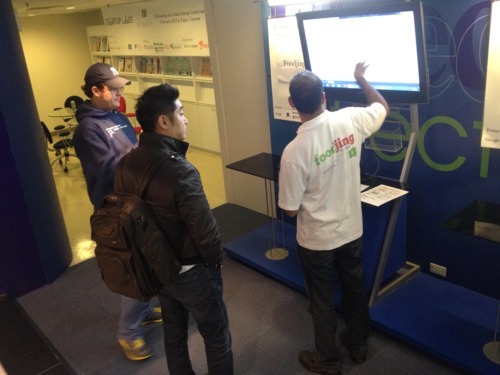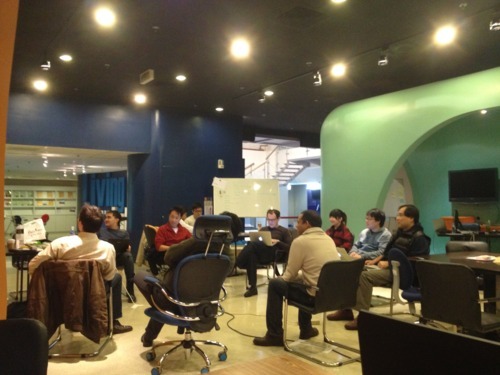
My team was fortunate enough to have been picked for Startup Labs’ inaugural Incubator program in Taipei, Taiwan from February 10 to March 2. In addition to seed funding, we were housed in a coworkspace for three weeks and encouraged to set and reach goals that honed our concept and focused on user acquisition during this short time. While there were many lows and highs during the time, we came away a lot stronger than we were going in. Here are 7 benefits that I found quite helpful from the program. If you are looking to join an incubation program, consider these benefits in addition to any funding you receive.
Team Building
In my team’s case, all four members moved to Taipei from a neighboring city for three weeks. This meant that we ended up spending a lot more time together than we normally would. In some cases, this could be a bad thing, but in our case, getting to know each other better was a positive! We got to see each other in stressful times when there was a deadline coming, when ideas weren’t coming together or after a long day when we were just tired and hungry! We also saw got to see each other in after hours settings, when it was time to unwind.
In each case, we got to see a different side of each other – one that we wouldn’t normally see, but that was good to know about. I’m now more confident going forward that we have assembled the right team of individuals who will have what it takes to perform when the going gets tough.
Vet your Idea
 As part of the incubation process, mentors, investors and other visitors were constantly pouring through the building to see what we were up to. Each time, I would present our idea and the progress we were making. This was a great way to get feedback and reactions from a broad group of people. Some of their ideas were added to our own to improve the concept.
As part of the incubation process, mentors, investors and other visitors were constantly pouring through the building to see what we were up to. Each time, I would present our idea and the progress we were making. This was a great way to get feedback and reactions from a broad group of people. Some of their ideas were added to our own to improve the concept.
Having mentors on hand also made it easy to just shout out to the next table “Hey David, what do you think about this idea?” I realized that our regular routine of working out of our own office kept us in a bubble of sorts, as we were not exposed to the regular feedback we were getting here.
Deadlines and Pressure
The main purpose of this incubation process was to show a delta in progress from our opening day pitch to our final demo. Goals and targets were assigned to each team early on, and pressure was applied to make sure we hit these targets. We were not used to such deadlines, but in this case, having them forced us to dig in and work 12 hour days to reach them. It also forced us to refine our plans to ones that could be tested and applied in much shorter time frames than what we would normally have. Instead of building a site and testing it out, we were forced to test mockup concepts first. This process saved us a lot of time, since it allowed us to throw away concepts that weren’t received well, rather than having to build it first to find this out.
Other Teammates
 In addition to getting to know our own teammates, being housed in the coworkspace with four other teams helped us get to know others who were in the same position as we were in. While each team had their own challenges, it was very helpful to have members of other teams present to bounce ideas off of, celebrate in their achievements and provide encouragement and support where possible. It was also helpful to listen to advice being given to other teams and look for areas where that same advice could be relevant to us as well.
In addition to getting to know our own teammates, being housed in the coworkspace with four other teams helped us get to know others who were in the same position as we were in. While each team had their own challenges, it was very helpful to have members of other teams present to bounce ideas off of, celebrate in their achievements and provide encouragement and support where possible. It was also helpful to listen to advice being given to other teams and look for areas where that same advice could be relevant to us as well.
Other Resources

Another benefit of having 5 teams together in the same coworkspace was that we had access to great resources and presenters. At various times during the three weeks, we had visitors from a local law firm who represented startups, Google, Microsoft, Facebook’s local ad representative and local and international bloggers, all providing advice in different areas. These were people we might not have had the opportunity to meet with on our own, but now had access to in the future.
Informal Time

While most of the time was spent working out of the coworkspace, after hour events were organized to get to know the investors and mentors in more informal settings. These were great, not only for letting off steam, but also for getting to know the people we were working with better. Who knew that they were real people with their own lives, families and issues?
Honing your Pitch

At the end of the 22 days, a final demo was organized for local and international investors, media and government representatives. In the days before the pitch, we were encouraged to practice our pitches in front of mentors, who would then provide advice on how to improve them. The advice provided was very good, and applied before the final demo. After the demo, many investors commented on how much better the final presentations were than the original ones on day one.
Now that the event is over, and we are back to our regular lives, the real work begins. Can we take the advice we learned and build something real with it? Stay tuned to find out!
